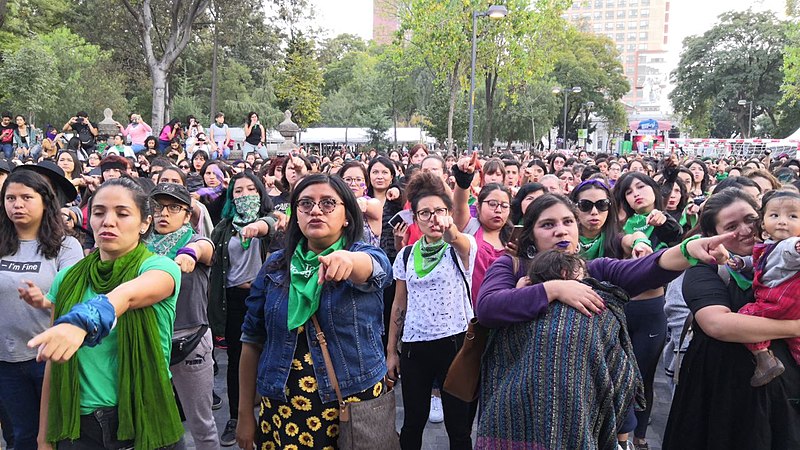By Laura Rodríguez Peña
Since the FARC (the Revolutionary Armed Forces of Colombia) was formed, in 1964, Colombia has been embroiled in conflict. A long peace process has since sought to de-escalate tensions between the Colombian government and the revolutionary movement.
In 2012, an agreement was signed, yet the conflict continued. In 2016, a ‘final agreement’ between the two groups was shot down again, failing to achieve legitimacy as the referendum rejected.
Violence remains Colombia’s main problem, especially against women. During war, violence against women has often passed unnoticed, but it is now becoming more visible. Colombian women have started to raise their voices about the state’s inefficiency to address this violence.
In 2019 (according to official data), 239 femicides took place in Colombia. Every 30 minutes a woman is subjected to physical aggression, one dying every three days. Young Colombian girls are also victims of this tragedy and 55 are raped every day.
Between January of 2018 and February of 2019, the government received 136,703 allegations of violence against women. Yet, according to UN women, one of every three women in Colombia have been beaten by their current or ex-partner at one point of their lives. This means that the number of victims might be even higher.
In addition to that, the wage gap between men and women in Colombia is 30%, meaning, if the government maintains its current policies, the gap won’t be closed until at least 2073. In other words, women will remain confined by the glass ceiling, working more hours at home, and receiving a bad salary for at least another 53 years.
Nonetheless, Colombia is different to other countries in South America where abortion is still illegal, abortion has been lawful since 2006. Given this, one may assume that women in Colombia have choice regarding their bodies, but this is not the case. Abortion is only legal for women who were raped, or when there is fetus malformation.
This means that if a woman in Colombia wants to have and abortion for different reasons she needs to do it in a clandestine way. This way, the abortion will often not be made by doctors, putting their safety at risk because of Colombia’s strict laws. Moreover, if a woman has an abortion outside the law, she can be prosecuted by the authorities. As a matter of fact, between 2005 and 2017, 2,209 women were criminalized in Colombia for their abortions.
The World health organization reported that every year 22 million abortions are made clandestinely. Even though, in the case of Colombia, abortion is permitted under the special circumstances described before, it is still judged negatively in their society. This is especially due to its rejection by the Church. Colombia has a very strong Christian tradition and the faith’s opinion is still important for many people in the country, therefore women who want to interrupt their pregnancy are not seen with good eyes by Colombian society.
This demonstrates that autonomy over their bodies is still a goal Colombian women haven’t reached. Along with this there are still many women’s rights to fight for in Colombia, for these reasons every November 25 women go to the streets to demonstrate their nonconformism regarding stigma and violence. Last year, it was even more special because thousands of Afro-Colombian women, indigenous women, lesbians, trans women, and women in general, took to the streets to join the national strikes against the Colombian government; but also to complain about the inefficiency of law enforcement which keeps most of the women violence crimes in impunity.
Besides that, on December 2 of 2019, hundreds of women in different cities of Colombia (Bogotá, Medellin, Cali) decided to make the Chilean performance “un violador en tu Camino” (a rapist on your path). The lyrics of this viral song describe how usually the victim is blamed for the clothes she wears but how the real one to blame is the rapist and the state for its incompetence.
Currently, different feminist groups are fighting and marching for their rights in Colombia, but the support of all society is needed.
Violence against women needs to be addressed and prevented with education at an early age. It should be the state’s duty to enhance strategies to change the violent mindset of many men and even some women in Colombia, and of course, detain all the violent aggressors.
Meanwhile, women in Colombia have to live with constant harassment, fearing violence and subjected to judgments, as if being born a woman was more like punishment. Very few women in Colombia are used to ignoring comments on the streets, looks and sometimes even more aggressive encounters, but this has been normalised and has not been addressed as the problem it is. Women should be able to live without fear in Colombia or any country.
To raise awareness and to commemorate women’s day Latin American society of the University of Sussex is performing “a rapist on your path”, opening discussions and hosting other activities next March.
Image credit: Wotancito

